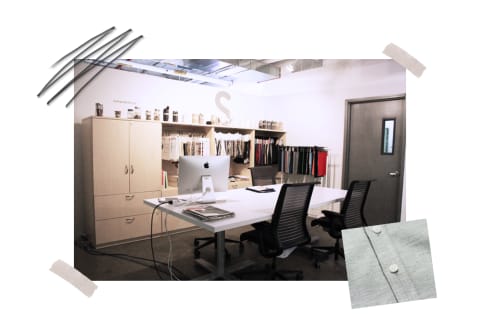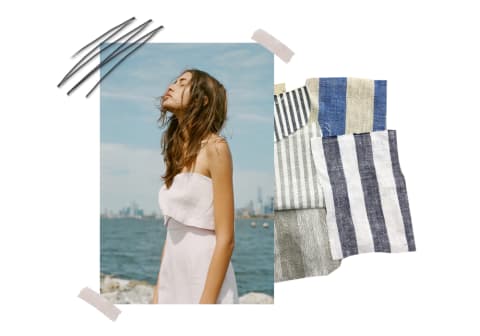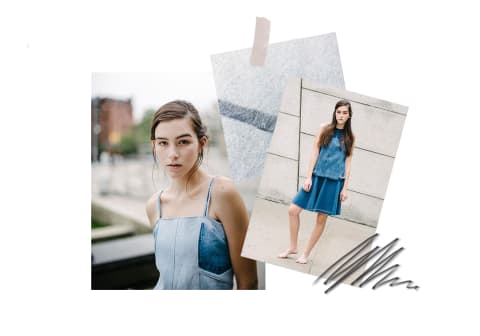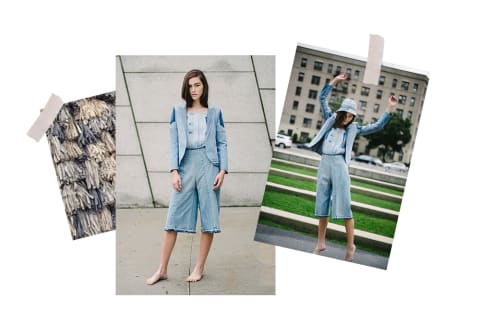The Brooklyn Fashion + Design Accelerator (BF+DA) is a community where aspiring and up-and-coming designers can gather for advice, materials and equipment. The catch? They have to be willing to create a line that is crafted with the planet in mind. Take Mara Hoffman’s new boho bathing suits made from recycled spandex, or Eileen Fisher’s entire line of staples made from recycled cashmere, wool and cotton that’s been re-spun into new fabric. Athletic companies are hopping on the green trend as well; Patagonia is repurposing plastic bottles and clothing scraps into polyester for its fleeces and jackets, while Adidas is designing sneaker material from ocean plastic. Meanwhile, popular younger brands like Everlane, Reformation, and Zady have all built transparency and sustainability into their business models from the beginning, using fabrics like organic cotton and tencel that’s naturally dyed with colors straight from nature. Pre-consumer waste refers to the scraps that designers often toss out during the production process. Brands like Brooklyn-based Zero-Waste Daniel are restoring these cast-asides into new clothes, saving roughly one pound of fabric scraps from landfill with every punchy patchwork garment. Thousands of miles away in Guatemala, The New Denim Project takes jean scraps and turns them into a soft, light blue fabric that you can now find stateside in stores like West Elm and Whole Foods. “I am noticing more than eco-conscious designers are being mindful of waste through both the development and production processes,” echoes Deanna Ansara of Vincetta. She uses cupro, a regenerated fabric derived from the often disregarded fibers that form on the outer shell of cotton plants. You don’t have to look past the BF+DA to see what this looks like in action—many of the designers in its structured mentorship program are breathing new life into old clothes. Take Noor Zakka, who uses reclaimed jeans in her line of structured dresses, bags and hats. “I founded NOORISM in 2015 after being disheartened by the volume of poorly-made, practically disposable clothes produced by the fashion industry every year,” Zakka says. “All of our pieces are unique and slightly different since each old pair of jeans has its own individual story to tell.” On the other side of the studio, Crystalyn Brennan uses surplus velvets reclaimed from interior design firms and leather scrap from factories in the city to craft her line of equally unique handbags. Newlife Yarns is a fiber mill turning bottles into yarn over in Italy, while Thread International is doing the same thing with bottles collected in Haiti, employing Hatains in the process. Back in the BF+DA, Laura Moffat and her partner Kelly are working on Kirrin Finch, a clean, androgynous line that features classic tees made from 50 percent recycled bottles (the other half is organic cotton). MycoWorks is another vegan dream. The leather-like material is made from mycelium, or mushroom skin. The brainchild of artist Phil Ross, it requires less energy, has a smaller environmental footprint than cow leather, and is biodegradable. Plus, mushroom can actually adhere to accessories like buttons and zippers during the incubation process, meaning it doesn’t need to be stitched or fussed with. Companies like Portland-based Olderbrother are cooking up plant-based dyes that can bring any sustainable fabric into vibrant life with shades of roots, plants, trees and, most recently, organic coffee beans. Emma received her B.A. in Environmental Science & Policy with a specialty in environmental communications from Duke University. In addition to penning over 1,000 mbg articles on topics from the water crisis in California to the rise of urban beekeeping, her work has appeared on Grist, Bloomberg News, Bustle, and Forbes. She’s spoken about the intersection of self-care and sustainability on podcasts and live events alongside environmental thought leaders like Marci Zaroff, Gay Browne, and Summer Rayne Oakes.






